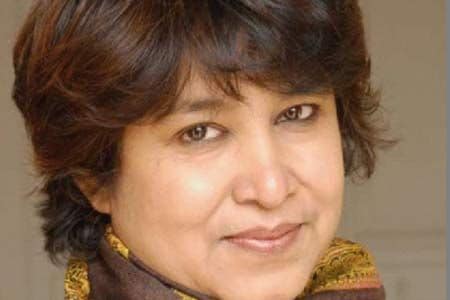
Taslima Nasreen (image courtesy: timesofindia.com)
In the predominantly Islamic nation of Bangladesh, the International Crimes Tribunal (ICT) set up by the secular government of Prime Minister Sheikh Hasina has handed down life sentences and death penalties to a number of leaders, mostly from the Jamaat-e-Islami Bangladesh, for their role in the 1971 war of liberation. As per Bangladeshi government claims, three million Bengali-speaking people were killed and hundreds of thousands of women suffered rape at the hands of the West Pakistan military for supporting the liberation movement in 1971.
Jamaat-e-Islami in Bangladesh, then East Pakistan, was against the liberation movement and supported the Pakistani military. Last February, a Cairo-like mass movement was called by liberal bloggers in Dhaka's Shahbag Square after the country perceived that the ICT's life sentence for Jamaat-e-Islami leader Ghulam Kader Mollah was too lenient. As Jamaat-e-Islami is at a disadavantage, another Islamist group, Hefajat-e-Islam, which is a collation of a dozen Islamic organizations, has emerged at the forefront, with demands such as death penalty for liberal bloggers. Recently, the ICT sentenced Jamaat-e-Islami leader Ghulam Azam to 90 years' imprisonment. (For more on Hefajat-e-Islam, see MEMRI Special Dispatch No. 5379, Bangladeshi Cleric: Women Should Never Leave The Home Or Have More Than A 4th-5th Grade Education; 'If You See A Woman... You Get Bad Thoughts [Lust] In Your Heart'; 'Why Do You Want Birth Control?', June 29, 2013.
The Awami League government of Sheikh Hasina, which faces an election no later than January 24, has an uphill task, as the right-wing coalition of parties led by Bangladesh Nationalist Party (BNP) is projected to win. BNP's win will strengthen the hands of Hefajat-e-Islam and Jamaat-e-Islami, with the former being already organizationally backed by the latter.
In an essay and an interview she gave to the investigative Indian magazine Tehelka, celebrated Bangladeshi feminist author and commentator Taslima Nasreen, who now lives in exile, discusses why she supported a recent court order banning the Jamaat-e-Islami from participating in politics and how religion's role is harming the Bangladeshi society.
Following are excerpts from her article[1] and from the interview with her.[2]
"I Supported That Demand [For The Ban On Jamaat-e-Islami] Even Though I Am All For Democracy, Because The Jamaat-e-Islami In Bangladesh Is A Terrorist Organization"
In her article, Taslima Nasreen wrote: "A collaborator of the Pakistani army, Azam was directly involved in killing 3 million people and the rapes of 2 lakh [200,000] women. After the assassination of Sheikh Mujibur Rahman, the founder of Bangladesh, Azam returned to the country with the help of the ruling Bangladesh Nationalist Party. Meanwhile, the Jamaat-e-Islami, the once-banned political party of Islamists, was given a free hand in the Islamization of politics. Beginning in the mid-1970s, Islamization went on to destroy the secular fabric of the newborn nation.
"Of course, Azam will not live another 90 years to end his prison term. An ailing man, he will stay in the hospital until he dies. He will not really suffer like other prisoners. He enjoyed a celebrity life for more than 40 years as the top leader of the Jamaat-e-Islami in Bangladesh, the country whose birth he violently opposed. Even though he will be privileged as a prisoner in his last days, still his punishment means a lot for the secular people in Bangladesh.
"The war criminals have got every opportunity to turn a secular country into Darul Islam, the land of Islam. Many of them were even made Parliament members. The Jamaat-e-Islami uses religion to win the hearts and minds of god-fearing ordinary people.
"A few months ago, however, there was a big secular uprising despite the threats of the Islamic fundamentalists. Many secularists demanded the banning of Jamaat-e-Islami. I supported that demand even though I am all for democracy, because the Jamaat-e-Islami in Bangladesh is a terrorist organization. The Islamists aim to bring theocracy and bury democracy and secularism forever."
"Bangladesh May Have Won The War In 1971, But The War Actually Is Far From Over; A War Is Still Going On, A War Of Two Opposite Ideas – Secularism And Fundamentalism; Between Rational, Logical Thinking And Irrational Blind Faith; Between Modernism And Barbarism, Humanism And Islamism"
"The punishment Azam got now in his 90s is just a symbolic one. Sheikh Hasina has been in power before, but she was reluctant to bring war criminals to justice. But this time, probably, the popularity of the recent secular movement [at Shahbag square of Dhaka, demanding death penalty for the Jamaat-e-Islami leaders involved in the 1971 war crimes] made her decide to punish war criminals. She got a huge number of votes in the last election after she promised to bring them to justice and fight the fundamentalists. Though she also promised to bring back the 1972 secular Constitution, as prime minister she showed no such initiative.
SUPPORT OUR WORK

"Her party [Awami League] is considered the most secular in Bangladesh, yet they arrested some secularist bloggers a few months ago. Indeed, there is no true secular political party in the country that can assure the security of all the people, including non-believers, and protect their right to express their opinions fearlessly.
"Bangladesh may have won the war in 1971, but the war actually is far from over. A war is still going on, a war of two opposite ideas — secularism and fundamentalism; between rational, logical thinking and irrational blind faith; between modernism and barbarism, humanism and Islamism; between those who value freedom and those who do not.
"The old generation committed an enormous mistake by letting fundamentalists influence the people. Now the new generation has to transmute their country into a secular nation — free of religion, fanaticism, fascism and barbarism. People need to get angry. I am painfully aware of the evil powers that once attempted to eliminate me, and with whom the pro-Islamist government ultimately conspired to throw me out of Bangladesh, my own country, 20 years ago, never to allow me in again…."
"[Although The Court Order Banning Jamaat-e-Islami From Politics] Is A Step In The Right Direction, The Society At Large Is Not Secular In Bangladesh; If The Government Suddenly Decides To Do Away With Islam As State Religion, The Masses Might Go Against Them"
The following are excerpts from Taslima Nasreen's interview:
Question: "What are your initial reactions to the court's decision to debar Jamaat from fighting elections?"
Taslima Nasreen: "It is indeed great news for all secularists that a religious organization that doubled up as a political party, has been finally banned from fighting elections. Although Jamaat is called a right-wing political organization, it is no less than a terrorist outfit. Dissent had no place in the reign of terror unleashed by Jamaat.
"The religious fundamentalists have left the Bangladesh society bleeding. Allowing them to engage in political activism is thus an insult to the principles on which Bangladesh was founded. Jamaat used foreign funds in brainwashing innocent kids at madrassas, gave them military training and unleashed their brute force on their own countrymen who refused to toe their line. A ban on such an organization is a welcome step indeed."
Question: "Do you think the Awami League government will now reinstate the 1972 Constitution and establish Bangladesh as a secular nation?"
Taslima Nasreen: "I do not think so. Although this court verdict is a step in the right direction, the society at large is not secular in Bangladesh. If the government suddenly decides to do away with Islam as state religion, the masses might go against them. Sheikh Hasina wouldn't want to make such a gamble with her poll fortunes. Awami League wouldn't want to be painted as anti-Islam in the election year."
Question: "What do you think will be the possible repercussions of the ban on Jamaat?"
Taslima Nasreen: "The Jamaat was a banned organization at the birth-hour of Bangladesh. After the 1971 Liberation War, when Sheikh Mujibur Rahman came to power, he banned the organization that sided with Pakistan against their own brothers and sisters, raped thousands, and killed even more. But after the death of Mujib, they were given a new lease of life by a few military men, solely for political motives. Thus began the process of Islamization of a secular nation, which is on till now. To return to the [secular] Constitution of 1972, we need a societal change, for which this ban was necessary."
"Several Parties Have Come To Power Since I Was Exiled; Faces Change, But The Nature Of The Ruler Doesn't; Be It Awami League Or The Bangladesh Nationalist Party, Everyone Needs The Support Of Islamists To Stay In Power"
Question: "Do you hope this verdict will pave the way for your return to your motherland?"
Taslima Nasreen: "Several parties have come to power since I was exiled. Faces change, but the nature of the ruler doesn't. Be it Awami League or the Bangladesh Nationalist Party, everyone needs the support of Islamists to stay in power. The state machinery in Bangladesh is afraid to stand up for freedom of expression; they lack the conviction to take on the fundamentalist forces in the country. We cannot expect the society to change overnight. The Islamization that has happened for decades in the country cannot be undone by just one verdict.
"The Awami League government may be more secular than other parties, but we must not forget that the same government arrested atheist bloggers during the Shahbag protests. Hence, I don't see any hopes for my return to my homeland anytime soon."
Question: "The Jamaat-e-Islami may hit the streets to protest against the court decision. Do you feel that the secular masses will rise again, like in Shahbag, to facilitate the process of formation of a secular state?"
Taslima Nasreen: "When Hefajat-e-Islam had unleashed terror on the streets with over five lakh [500,000] people taking law into their hands during an anti-government demonstration, the administration had dealt with them with an iron hand. If the government is ready to take the Islamic fundamentalists head-on, there is no need for the people to take to the streets. I have faith that the government will once again assume an unbiased role, for the cause of the nation."
Question: "Do you think the ripples of the Bangladesh verdict will be felt in India too?"
Taslima Nasreen: "Bangladesh is too small a nation for the Indian government to take note of. India is more concerned about the daily happenings in Pakistan. However, I feel that India must give Bangladesh the credit it deserves for showing the resolve to fight religious fundamentalism. Islamist organizations based in India should take a cue from this verdict and mend their ways. Moreover, parties in India should shun religion-based politics. Parties cry foul in the name of democracy when their religious intents are exposed. However, according to me, religion is the biggest bane for any democracy."
Endnotes:




